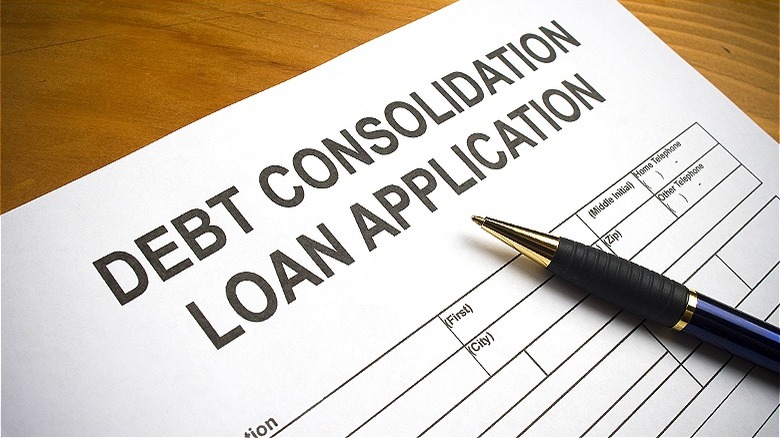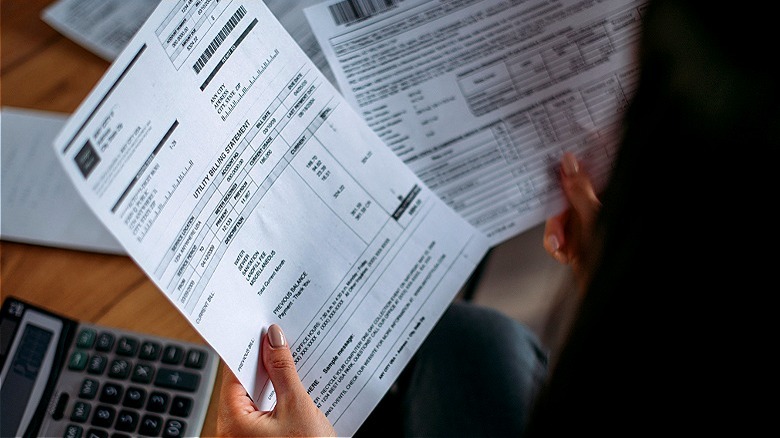Things To Keep In Mind Before Consolidating Your Debt
Many people dream of a thriving investment portfolio and the budgetary prowess to lift themselves up out of the middle class and into a life of consistent fiscal stability, but high-interest debt is killing the American worker's ability to create financial stability for themselves. Credit card debt is a vicious enemy, in particular, that all too often thwarts these plans, however. The average credit card interest rate stands at nearly 25%, and virtually no plastic ships to card users these days with an APR that's south of 20%.
If you're struggling with high-interest credit card debts and other repayment obligations that have become unwieldy, a debt consolidation opportunity might seem like a great idea. At its core, debt consolidation will see you combine multiple accounts into one. Collapsing minimum payments and loan balances together can produce a powerful lifting effect that helps you manage your debt more successfully, eventually culminating in complete repayment. But debt consolidation opportunities aren't for everyone and some solutions to this financial problem will be better than others. If you're considering consolidating your debt, these five things are crucial to understand before making any decision about your financial future.
Consolidation might offer improved repayment terms
A debt consolidation loan, or any other type of debt consolidation tool, operates on the premise of improving repayment terms. Any transfer of debt that doesn't provide an improvement to your budget and balance sheet is one that should be avoided. High-interest rate personal loans, for instance, aren't valuable to debt consolidators in most cases. In order to take out a new loan, open a new credit card, or utilize any other lending product for this purpose, there will need to be at least a basic incentive for the borrower. Balance transfer offers often come along with a zero- or low-interest rate period, and consolidation loans might not include an origination fee or offer low monthly payments that reduce your monthly requirement by a key margin.
The idea here is to improve your outcome in some way or another. Some borrowers will be looking to reduce their monthly payments while others might be seeking the fastest possible pathway to debt elimination. Favorable repayment terms stand as the first test for any debt consolidation approach you may be considering.
You'll need to consider your income situation
In addition to terms that make sense for your repayment goals, your ongoing financial situation is something to keep in mind when pursuing a new lending product of any sort. This is particularly true for debt consolidation loans that will substantially restructure your existing debt burden.
If your income is in a state of uncertainty of any kind, thinking long and hard about your ability to repay before restructuring debt is a must. There are always going to be unforeseen circumstances that arise, but a sudden injury or illness that changes your repayment ability isn't the same as an ongoing state of flux. Seasonal workers, gig employees, or those considering a change in workload hours or their workplace responsibilities might want to rethink their approach and/or tread very carefully when shopping around for debt consolidation options. If you're using a balance transfer, introductory APR offers may not remain in effect should you miss a payment, and similar consequences may present themselves in other consolidation products in the event of a missed or late payment.
Personal loans and balance transfers are viable options
There are two primary avenues that consumers use to consolidate their debt: personal loans and balance transfer offers. Personal loans designed specifically for debt consolidation are offered by a wealth of banks and other financial institutions; in fact, you may even be able to find this type of loan product on a peer-to-peer lending platform. Your credit score will go a long way to determine your interest rate and repayment options. The better your score the more beneficial the loan will typically be. Those with good credit scores may qualify for loans without an origination fee or be offered much lower interest rates. A consolidation loan places an end date on your repayments in a way revolving credit lines cannot match. Borrowers opting for this approach will make monthly repayments over a preset loan term and when the debt is paid off, it is simply gone.
A common alternative to a personal loan is the use of balance transfer offers. Your existing credit cards might provide decent balance transfer terms, or you might consider opening a new credit card account specifically to utilize a transfer. These offers sometimes extend a zero-interest period out over a year or longer. This means that you'll be able to tackle the principal of the debt directly for a lengthy period of time. But still, it's important to remain vigilant about your payoff strategy as a return to the standard interest rate can place you right back in troubled waters.
Be wary of debt settlement companies
Sadly, one feature of the debt consolidation industry is something borrowers will need to remain wary of. It's entirely possible that in your search for a debt consolidation loan you'll come across a debt settlement company masquerading as a lender. Debt settlement companies aren't the same thing as lenders, even though they might talk a big game once they get you on the phone and may even claim to offer loan products, too. While settlement is the right move for some borrowers, for most people looking to consolidate repayments while maintaining their credit, settlement strategies are destructive practices that won't help achieve the end goal.
Instead of consolidating multiple repayments into one lending product, a debt settlement company will direct you to pay into an escrow account instead of contributing monthly payments as normal. After months of making payments to this account, a settlement company will approach your lenders and attempt to renegotiate the amount of money you'll have to pay in order to settle the account(s). Upon successful settlement, any account the company has targeted will be closed. While it's certainly possible to pay less in total through a debt settlement strategy, there's no guarantee it'll work; you'll pay the company for its service either way, and while you're working through the process your credit will be trashed. This is a viable option for someone seeking to simply end their existing debt woes. But it'll leave you in dire straits credit-wise, leading you to a secondary need to repair your credit standing.
When consolidating debt works best
The bottom line is that consolidating your debt works best when paired with budgeting strategies designed to minimize future opportunities to dig yourself into a hole. Before even considering a debt consolidation option, it's important to think about your budget and how you're spending your money. Cutting out frivolous expenses is a great starting point when looking to transform your financial landscape. Combined with a consolidation loan or balance transfer offer that helps you become debt-free faster, reorganized budgetary priorities can help you gain financial control and then retain it.
For any borrower who isn't serious about staying financially secure, a debt consolidation strategy might only serve to stem the tide in the short term. Balance transfers ultimately only provide relief for those who are serious about paying off the money that's been moved. Similarly, the consolidation loan that frees up your credit card balances does no good if you turn around and start spending on those cards again. In truth, solid financial management is a two-pronged project. It doesn't magically transform into a lighter burden if you open a new line of credit or consolidate debts under a new loan's umbrella. Both sides of the coin come into play for anyone serious about minimizing and eventually eliminating debt.





